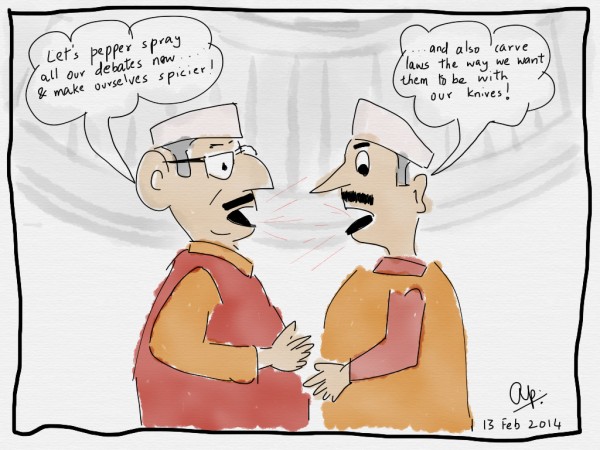Thich Nhat Hanh wrote: ‘In true dialogue, both sides are willing to change.’ This is true of men. This can be true for any human-human situation or conflict. Well, I’m not very sure if this is possible every time but we’ll examine it later.
Let us examine other situations now before we go to a human-God dialogue. So what do you do in a human-animal situation? Would it go something like ‘hello, my dear tiger, don’t eat me because I can promise you ten kg of fresh meat every day for ten years’ and then expect the tiger to give a canine-smile, nod, and return to his tigress to tell her that he has managed to sign a food security bill successfully? No, this never happens. There can be no conventional dialogue in a human-animal situation. There may be certain animal-human conflicts where a ‘shoo!’ might suffice or signs of aggression and yes, this can be considered a form of dialogue too. After all, if two humans can interact with exclamations and gestures, why can’t a human try and communicate the same way with an animal? So my verdict is that animal-human interaction, despite it’s a rather esoteric existence, is a dialogue of sorts. However, it isn’t always possible to observe a permanent change in an animal-human situation as the chances if its escalating into a conflict is quite large. Therefore, despite a form of dialogue being possible, a human-animal situation cannot possibly have a true dialogue… not even if you threaten an animal with pepper spray!
A human-God relationship is based on the premise that God exists. So here we have the first obstacle… but even if we presume the existence of this invisible entity, I’m sure any communication cannot have a two-way change. I mean, I might inform God that I’ll write a blog post every day for an year and ask Him to withdraw facets like a writer’s block and give me a steady supply of viable ideas… but my personal experience tells me that God never budges from his stand of making us search for ideas on our own and dealing with a writer’s block any way we want to. If you find this example difficult to decipher, let us consider the time when I asked God to… wait, I have a feeling that all my examples are turning out to be my asking God for a favour and my informing Him of some action that I would adopt in return for that favour. Dialogues don’t work this way. There has to be some language forming a bridge… and at least I am not aware of any language that connects humans to the Gods. So here again I must admit that no real dialogue is ever there in a human-God situation… and anyway, even if you carry pepper spray with you, whom are you going to spray it on?
So what about a human-human situation? Well, we understand each other through verbal or non-verbal language. Look at what happened in the parliament today… there was an MP from Andhra Pradesh who was trying to communicate his thoughts to the other MPs there and finding them unresponsive to any form of language he adopted, he used pepper-spray. This seems to have worked because the entire media is worked up, the political parties are worked up and the aam aadmi all over the country is worked up. I’m sure there are nukkad dialogues in progress everywhere and their debates are as hot as the ones on the TV channels. So now we realise that even pepper spray helps in a two-way communication channel being opened and L Rajagopal is a happy man. However, will he change because of this dialogue that has now opened up? Will the politicians change? Will our parliamentary democracy change because of this pepper spray incident? This dialogue is going on all over the country… so will each of us be willing to change and be a better person with defined rules to govern his existence?
The basic problem with a dialogue is that it expects both participants to agree to change. Does this ever happen? Look at the conflicts you have within your home or office and I’m sure you’ll agree that despite a heavy dose of dialogues, change doesn’t come in a spirited form. It may come crawling or grovelling to you and because it is anyway dying and withering away, you will generally allow it to do that. A change dies faster than anything else, my friends. And we happily get back to our own fascinating trenches and dig in to defend ourselves more aggressively.
It is thus vital to realise that a true dialogue never really takes place anywhere. And this is why we all need to evolve much before it makes its appearance.
Arvind Passey
13 February 2014










2 comments
matheikal says:
Feb 16, 2014
Our parliamentary entertainment is getting murkier. Even God must have given them up as clownish criminals.
Arvind Passey says:
Feb 24, 2014
Yes, that’s for sure… let us hope though that these clowns evolve into responsible politicians. 🙂